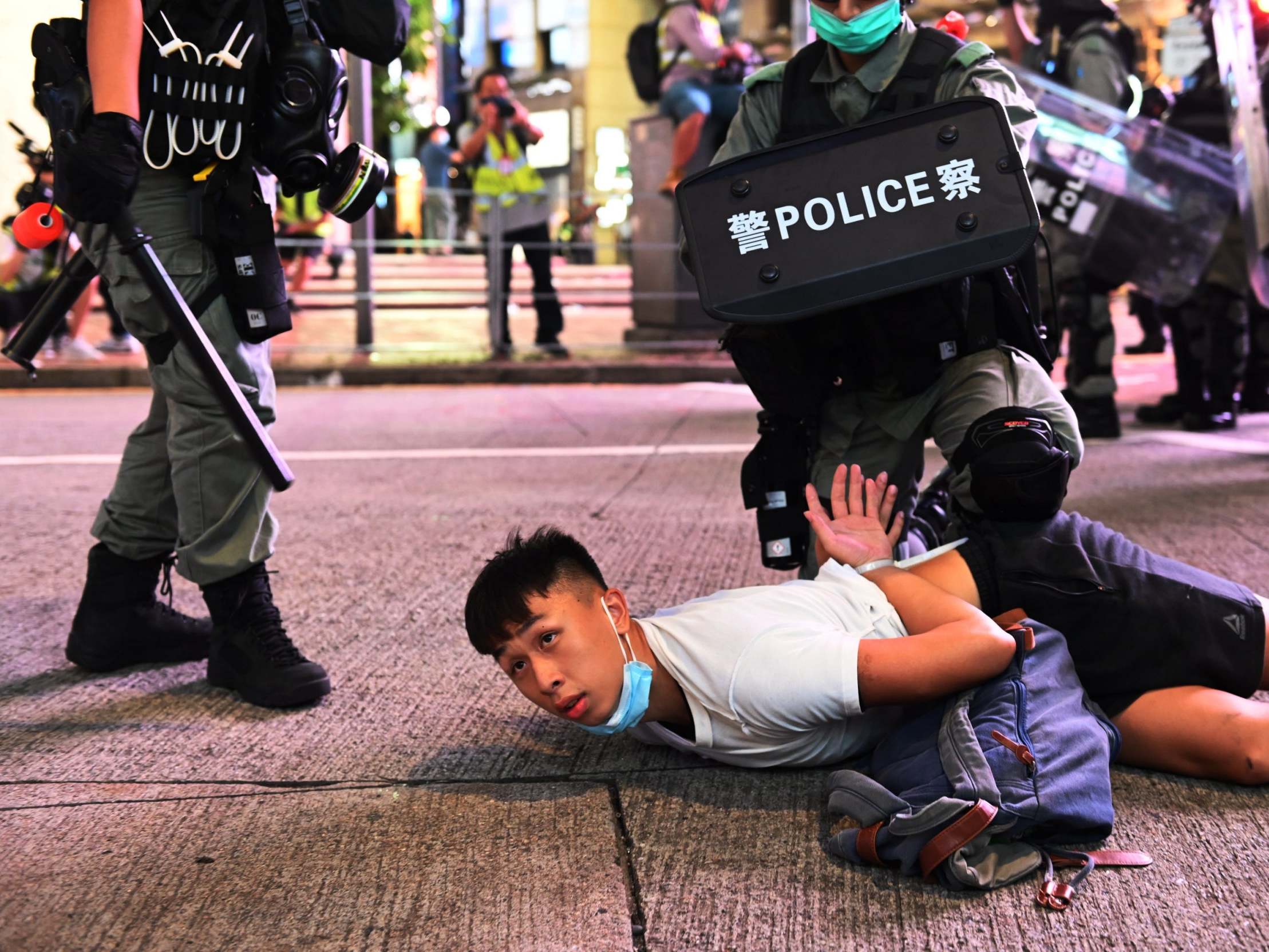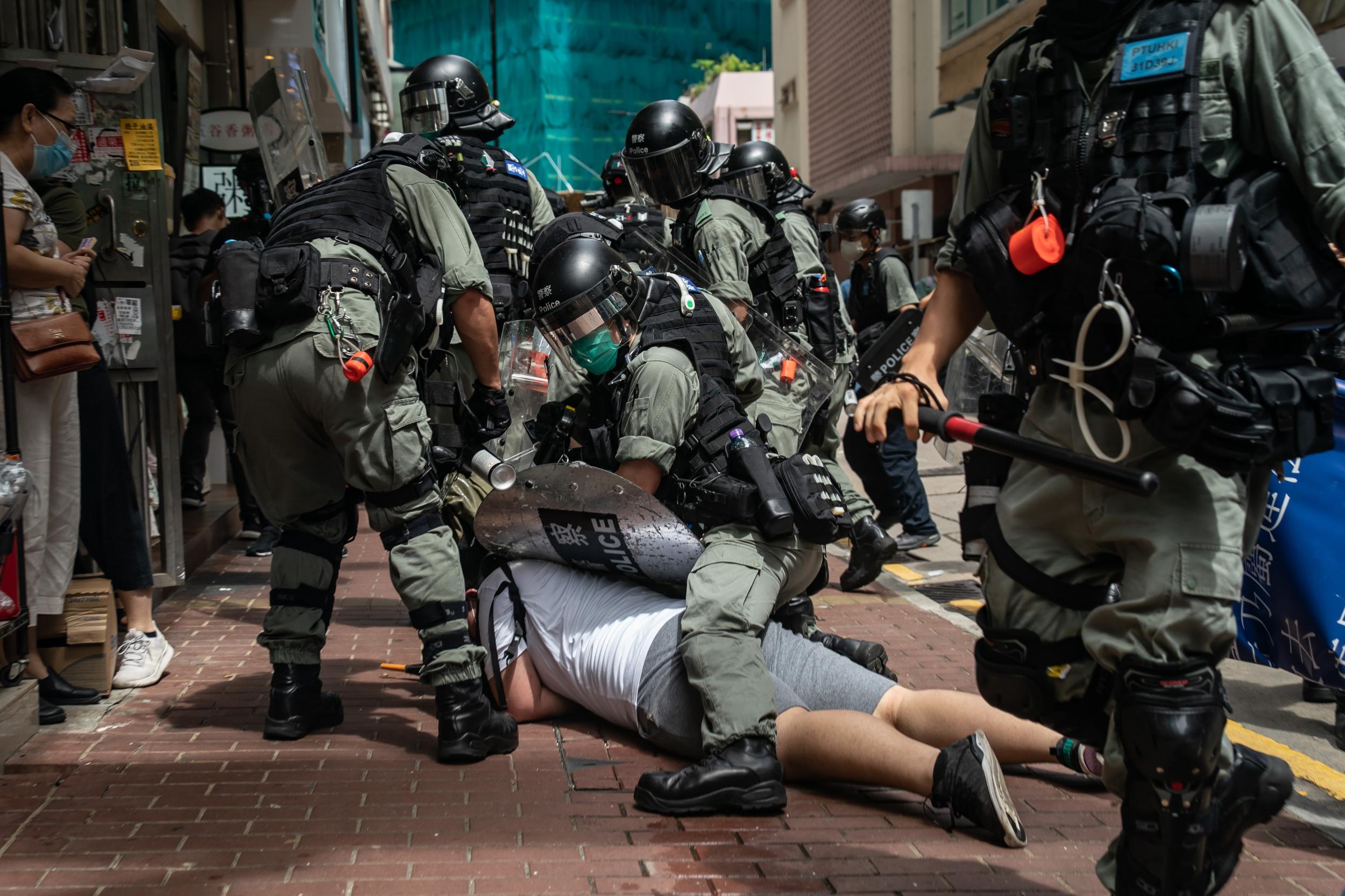Hong Kong police charge first person under China's sweeping new security law
UN says it is ‘alarmed’ at arrests
A man who allegedly drove a motorbike at police in Hong Kong during protests against China’s new national security law has become the first person to be charged under the legislation.
“A 23-year-old local man has been charged with one count of inciting others for secession and one count of terrorist activity,” police said in a statement on Friday.
Officers said the suspect, who was carrying a sign saying “Liberate Hong Kong, revolution of our times” was charged for “ramming” into several police at the unauthorised protest on Wednesday, injuring some. He was initially arrested for dangerous driving, local media said.
The United Nations, meanwhile, voiced concern that “vague and overly broad” provisions in the law may lead to activists being prosecuted in violation of fundamental freedoms of assembly and expression. Hong Kong’s activists have vowed to set up a “parliament in exile”.
A video circulating online showed the driver knocking over several officers with his motorbike on a narrow street, before falling off and getting arrested.
The charge against him, as shown in a court document on Friday, comes less than 24 hours after the city’s government said the protest slogan “Liberate Hong Kong, revolution of our times” is now illegal as its connotes separatism or subversion under the new law.
The rallying cry appears on placards at most rallies, is printed on T-shirts and accessories, and scribbled on post-it notes on walls across the Chinese-ruled city.
The government’s ruling on the slogan will compound fears about the suppression of the global financial hub’s freedoms.
China’s parliament adopted the security law in response to protests last year triggered by fears that Beijing was stifling freedoms, which were guaranteed by a “one country, two systems” formula, agreed when the former British colony returned to Chinese rule in 1997. Beijing denies the accusation.
The new legislation was signed into law by president Xi Jinping and came into effect on Tuesday night.

Despite the introduction of the legislation, which critics say will undermine the rights of Hongkongers to protest, thousands of demonstrators took to the streets to oppose the law on the 1 July anniversary of the territory being handed over from British to Chinese rule.
Hundreds were arrested as police used water cannons, pepper spray and rubber bullets in an attempt to subdue the protests.
Most were arrested for illegal assembly but at least 10 have been detained under the new legislation banning “secessionist” activities and “subversion” of the Chinese state.
Nathan Law, one of Hong Kong’s most prominent young democracy activists, told the BBC he has fled the territory following the imposition of the law.
Other activists are discussing plans to create an unofficial parliament-in-exile to preserve democracy in the territory and send a strong message to leaders in China that fundamental freedoms can not be crushed.
Up to three million residents of the former British colony have been offered the right to settle in the UK and ultimately apply for citizenship after Beijing imposed the law.
The UK government believes the law breaches the Sino-British Joint Declaration.
But Dominic Raab said that if Beijing tried to stop people with British National (Overseas) status from leaving Hong Kong, there would be little that could be done by the UK.
Mr Raab told ITV’s Peston programme: “Ultimately if they follow through on something like that there would be little that we could do to coercively force them.
“There is an issue around freedom and human rights in Hong Kong, and there is an issue around China keeping its word on an international obligation it made to the United Kingdom back in 1984.”
He added: “I wouldn’t want to be naive about this: I think we need to be realistic. But I do think that China as a rising, leading member of the international community is sensitive to the reputational risk in all of this but clearly not sufficiently that it hasn’t proceeded anyway...
“There is diplomatic leverage, there are other ways that we can persuade China not to fully implement either the national security law or some of the reprisals you talk about.
“But ultimately we need to be honest that we wouldn’t be able to force China to allow BN(O)s to come to the UK.”
In response, the Chinese Embassy in the UK said Beijing reserves the right to take “corresponding measures” and urged the UK against “interfering in Hong Kong affairs in any way”.

A man is detained by riot police during the demonstrations (Getty)
A statement said: “We firmly oppose this and reserve the right to take corresponding measures.
“We urge the British side to view objectively and fairly the national security legislation for Hong Kong, respect China’s position and concerns, refrain from interfering in Hong Kong affairs in any way.”
Downing Street stood firm despite the prospect of retaliatory measures from Beijing.
“We were very clear in the action we would take if China imposed this law,” the prime minister’s official spokesperson said. “We will now do exactly what we said we would do.”
“Final details of the scheme for BNO citizens will be set out by the Home Office ‘in the coming months’,” the spokesperson added.
Meanwhile, Australia is considering offering visas to Hongkongers now found to be in danger.
Prime Minister Scott Morrison told reporters that safe haven arrangements were being looked at “very actively”, adding: “Are we prepared to step up and provide support?’ The answer is, ‘yes’.”
As of February, there were nearly 350,000 BN(O) passport holders, while the government estimates there are around 2.9 million BN(O)s living in Hong Kong.
Additional reporting by agencies
Join our commenting forum
Join thought-provoking conversations, follow other Independent readers and see their replies
Comments
Bookmark popover
Removed from bookmarks